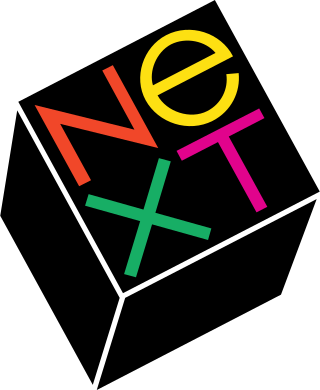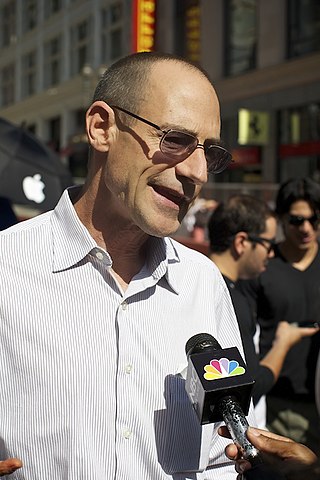Related Research Articles

NeXT, Inc. was an American technology company headquartered in Redwood City, California that specialized in computer workstations for higher education and business markets, and later developed web software. It was founded in 1985 by CEO Steve Jobs, the Apple Computer co-founder who had been forcibly removed from Apple that year. NeXT debuted with the NeXT Computer in 1988, and released the NeXTcube and smaller NeXTstation in 1990. The series had relatively limited sales, with only about 50,000 total units shipped. Nevertheless, the object-oriented programming and graphical user interface were highly influential trendsetters of computer innovation.

NeXTSTEP is a discontinued object-oriented, multitasking operating system based on the Mach kernel and the UNIX-derived BSD. It was developed by NeXT Computer, founded by Steve Jobs, in the late 1980s and early 1990s and was initially used for its range of proprietary workstation computers such as the NeXTcube. It was later ported to several other computer architectures.

OpenStep is an object-oriented application programming interface (API) specification developed by NeXT. It provides a framework for building graphical user interfaces (GUIs) and developing software applications. OpenStep was designed to be platform-independent, allowing developers to write code that could run on multiple operating systems, including NeXTSTEP, Windows NT, and various Unix-based systems. It has influenced the development of other GUI frameworks, such as Cocoa for macOS, and GNUstep.
NeXT Computer is a workstation computer that was developed, marketed, and sold by NeXT Inc. It was introduced in October 1988 as the company's first and flagship product, at a price of US$6,500, aimed at the higher-education market. It was designed around the Motorola 68030 CPU and 68882 floating-point coprocessor, with a clock speed of 25 MHz. Its NeXTSTEP operating system is based on the Mach microkernel and BSD-derived Unix, with a proprietary GUI using a Display PostScript-based back end. According to the Science Museum Group, "The enclosure consists of a 1-foot die-cast magnesium cube-shaped black case, which led to the machine being informally referred to as 'The Cube'."

Taligent Inc. was an American software company. Based on the Pink object-oriented operating system conceived by Apple in 1988, Taligent Inc. was incorporated as an Apple/IBM partnership in 1992, and was dissolved into IBM in 1998.
Avadis "Avie" Tevanian is an American software engineer. At Carnegie Mellon University, he was a principal designer and engineer of the Mach operating system. He used that work at NeXT Inc. as the foundation of the NeXTSTEP operating system. He was senior vice president of software engineering at Apple from 1997 to 2003, and then chief software technology officer from 2003 to 2006. There, he redesigned NeXTSTEP to become macOS. Apple's macOS and iOS both incorporate the Mach Kernel, and iPadOS, watchOS, and tvOS are all derived from iOS. He was a longtime friend of Steve Jobs.

Be Inc. was an American computer company that created and developed the BeOS and BeIA operating systems, and the BeBox personal computer. It was founded in 1990 by former Apple Computer executive Jean-Louis Gassée, who also served as the company's CEO, and was based in Menlo Park, California.
Macworld/iWorld was an information technology trade show with conference tracks dedicated to Apple's Mac platform. It was held annually in the United States during January. Originally Macworld Expo and then Macworld Conference & Exposition, the gathering dates back to 1985. The conference was organized by International Data Group (IDG), co-publisher of Macworld magazine.

Rhapsody is an operating system that was developed by Apple Computer after its purchase of NeXT in the late 1990s. It is the fifth major release of the Mach-based operating system that was developed at NeXT in the late 1980s, previously called OPENSTEP and NEXTSTEP. Rhapsody was targeted to developers for a transition period between the Classic Mac OS and Mac OS X. Rhapsody represented a new and exploratory strategy for Apple, more than an operating system, and runs on x86-based PCs and on Power Macintosh.

Interface Builder is a software development application for Apple's macOS operating system. It is part of Xcode, the Apple Developer developer's toolset. Interface Builder allows Cocoa and Carbon developers to create interfaces for applications using a graphical user interface. The resulting interface is stored as a .nib file, short for NeXT Interface Builder, or more recently, as an XML-based .xib file.
Ellen Mooney Hancock was a technology manager from the United States who worked for IBM and Apple, among others.

Apple Inc., originally Apple Computer, Inc., is a multinational corporation that creates and markets consumer electronics and attendant computer software, and is a digital distributor of media content. Apple's core product lines are the iPhone smartphone, iPad tablet computer, and the Mac personal computer. The company offers its products online and has a chain of retail stores known as Apple Stores. Founders Steve Jobs, Steve Wozniak, and Ronald Wayne created Apple Computer Co. on April 1, 1976, to market Wozniak's Apple I desktop computer, and Jobs and Wozniak incorporated the company on January 3, 1977, in Cupertino, California.

Jonathan J. "Jon" Rubinstein is an American electrical engineer who played an instrumental role in the development of the iMac and iPod, the portable music and video device first sold by Apple Computer Inc. in 2001. He left his position as senior vice president of Apple's iPod division on April 14, 2006.
Richard Page is an alumnus of Apple Inc. He was an Apple Fellow at Apple Computer in the 1980s, and later joined Steve Jobs at NeXT.

Scott James Forstall is an American software engineer, known for leading the original software development team for the iPhone and iPad. He is also a Broadway producer known for co-producing the Tony award-winning Fun Home and Eclipsed with Molly Forstall, his wife, among others. Having spent his career first at NeXT and then Apple, he was the senior vice president (SVP) of iOS Software at Apple Inc. from 2007 until October 2012.
Mac operating systems were developed by Apple Inc. in a succession of two major series.
The following outline of Apple Inc. is a topical guide to the products, history, retail stores, corporate acquisitions, and personnel under the purview of the American multinational corporation:

Andrew "Andy" C. Stone is an American computer programmer best known for his iOS app Twittelator, which to date has sold over a million units for the iPhone and the iPad. The founder, director, and principal programmer for Stone Design Corporation, Albuquerque, New Mexico. In his 25 plus year career as a programmer, he has published over 35 software titles for Hypercard, the NeXT workstation, Mac OS X, and for iOS iPhones and iPads. He retired from software development in 2015.
The NeXT Introduction, sub-titled "the Introduction to the NeXT Generation of Computers for Education", was a lavish, invitation-only gala launch event for the NeXT Computer. It was described as a multimedia extravaganza. It was held at the Louise M. Davies Symphony Hall, San Francisco, California on Wednesday October 12, 1988. The event ran from 9:30am till 12 noon. Attendees were all given a unique launch event poster.

Mac OS is the series of operating systems developed for the Macintosh family of personal computers by Apple Computer, Inc. from 1984 to 2001, starting with System 1 and ending with Mac OS 9. The Macintosh operating system is credited with having popularized the graphical user interface concept. It was included with every Macintosh that was sold during the era in which it was developed, and many updates to the system software were done in conjunction with the introduction of new Macintosh systems.
References
- 1 2 3 "Develop: the Apple technical journal". Vintageapple.org. Retrieved 29 February 2024.
- ↑ "Develop: the Apple technical journal". machtech.com. Retrieved 29 February 2024.